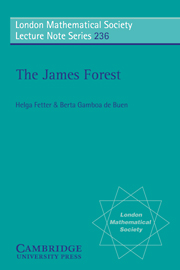Preface
Published online by Cambridge University Press: 19 March 2010
Summary
The James space J and the James tree space JT were constructed by Robert C. James in 1950 and 1974 respectively, to answer negatively several long standing conjectures in Banach space theory regarding the reflexivity of Banach spaces with enough good properties, such as for example having a basis or a separable dual. Since then these spaces have proved to be counterexamples to many other conjectures and have been the cornerstone for constructing other spaces which have enriched the wealth of existing Banach spaces.
On the other hand, the study of their inherent properties has created new branches in the geometry of Banach spaces, leading to the development of diverse topics such as the theory of quasi-reflexive spaces and the Banach spaces based on binary and other trees; the list of references in the bibliography, exceeding 100 titles, gives an indication of the vast amount of work devoted to the study of the subject, which nonetheless is far from exhausted.
Yet, to the best of our knowledge, a unified account of the theory of James spaces is still lacking. Therefore we think that a monograph on these spaces may prove to be useful for the students of these matters.
Given the size of the subject, a completely self-contained and exhaustive exposition seems impossible; hence a selection of the material was unavoidable. We chose to concentrate on the most classical papers dealing with James spaces; however, for the sake of completeness, we give a brief account of most of the new results in the last two chapters.
Information
- Type
- Chapter
- Information
- The James Forest , pp. 1 - 3Publisher: Cambridge University PressPrint publication year: 1997
